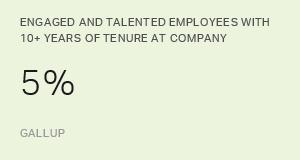Full human potential is realized only when people are in a position to use their greatest talents. Great performance is found when people are in roles that match what they naturally do best. Matching the right person with the right job is probably the most significant challenge organizations and managers face today.
Putting people in the roles that best fit their greatest talents is one of the 12 key discoveries from a multiyear research effort by The Gallup Organization. Our objective was to identify the consistent dimensions of workplaces with high levels of four critical outcomes: employee retention, customer metrics, productivity, and profitability. The research identified 12 dimensions that consistently correlate with these four outcomes -- dimensions Gallup now uses to measure the health of a workplace. An associated research effort, in which Gallup studied more than 80,000 managers, focused on discovering what great managers do to create quality workplaces.
Our research found that the best way to measure whether employees' talents are being used is to ask them the degree to which they agree with the statement, "At work, I have the opportunity to do what I do best every day." Having an opportunity to do "what I do best," every day, is tied to the integration of a person's talents (naturally recurring patterns of thought, feeling, and behavior that can be productively applied), skills (what he or she can do), and knowledge (what he or she knows). Talents are the patterns that can't be turned on and off at will. Great managers realize that while talents are the differentiating factor in excellent performance, they can't be created or altered. In contrast, one's skill sets and knowledge can be changed.
The best managers see the specific talents needed for every role. Conventional wisdom dictates that some roles are so easy, they don't require talent. Great managers rebuff this belief. The best front-desk clerks in a hotel, for example, have a talent for "winning others over." They establish a trust relationship with people within the first 7 seconds of an interaction. Great telephone service and sales personnel are talented in having a "third ear," or the ability to connect visually and emotionally with people they talk to on the phone. Outstanding accountants see patterns in numbers and "hear" a message or story from them.
Excellence should be revered in every role. Often, managers think that because they would not want a particular job or have the talent to perform it well, they must manage it as a job no one would want to do, thus creating a self-fulfilling prophecy. This is, however, a false perspective. The task of the best managers is to clearly define the talents needed for excellence in each role, and then choose the right person for that role. A manager's job is not to make people grow talents they do not have, but to identify and use their existing talents to their fullest potential.
In next week's column, we explore Item 4 of 12: "In the last seven days, I have received recognition or praise for doing good work."


